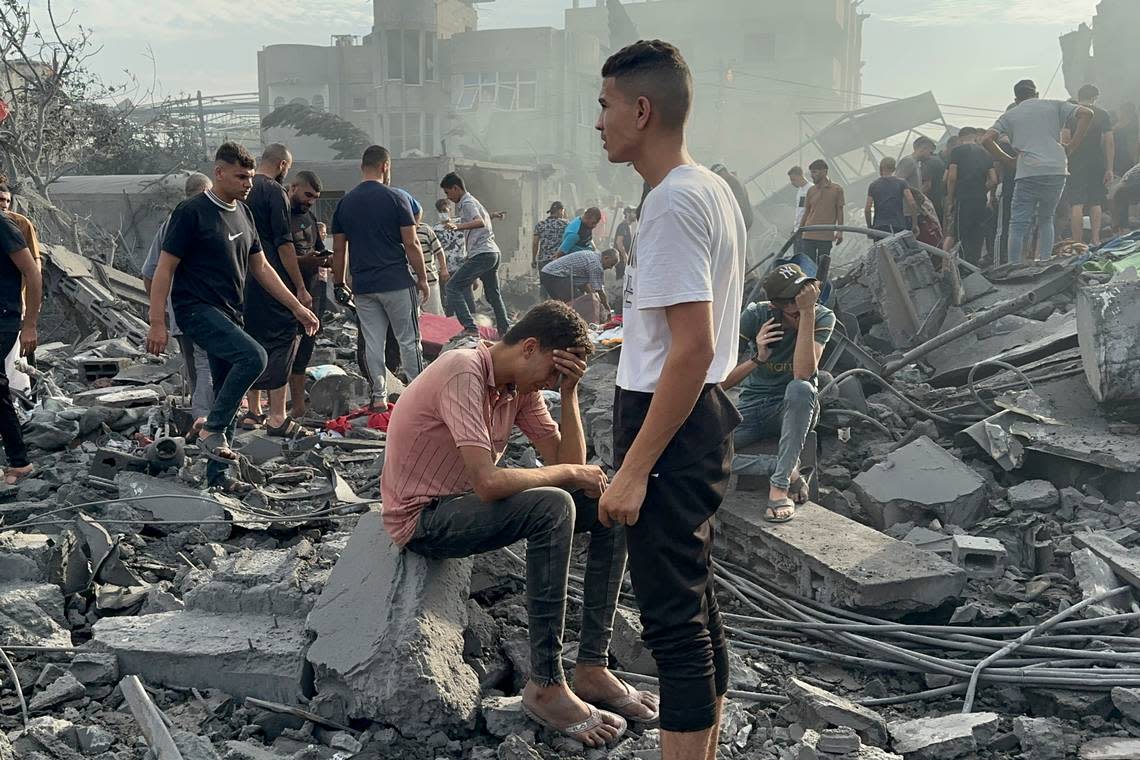Who wants cease-fire in Gaza? These US, world leaders call to pause Israeli-Hamas war

While testifying before Congress to request military aid for Israel on Oct. 31, Secretary of State Antony Blinken was interrupted by a handful of pro-Palestinian protesters.
Their shouts for a cease-fire in Gaza briefly rang out through the chamber before they were escorted outside and the proceedings resumed, according to C-SPAN footage.
However, the protesters are not alone in their plea. As Israel escalates its military campaign in Gaza — which has left more than 8,500 dead, according to Palestinian health officials — multiple world leaders, including American lawmakers, have called for a pause in the fighting.
Israeli and Biden Administration officials have strongly pushed back against such calls, saying that grinding the conflict to a halt would only benefit Hamas, the Islamic militant organization that controls Gaza.
Calls for a cease-fire
“The war in Gaza has become a humanitarian crisis and has claimed the lives of innocent Palestinians,” said a joint statement released on Oct. 27 by nine Democratic senators and Sen. Bernie Sanders, an independent.
“We are calling for humanitarian pauses to allow full, rapid, safe and unhindered humanitarian assistance for civilians and the immediate, unconditional release of all remaining hostages,” the statement said.
When contacted by McClatchy News, none of the senators’ offices immediately responded to a request for comment.
Their statement comes less than two weeks after four House Democrats, including Reps. Rashida Tlaib and Cori Bush, called for a cease-fire.
“We need legislation that saves as many lives as possible, no matter one’s faith or ethnicity,” Tlaib said in the statement. “I am proud to join my colleagues and a coalition of human rights advocates in calling for de-escalation, ceasefire, and a strong humanitarian response that prevents more devastating civilian casualties across the region.”
Some lawmakers in the United Kingdom, which provides military support to Israel, have also pushed for a break in hostilities.
“Today, I am thinking of human beings in Gaza buried under the rubble,” Jeremy Corbyn, the former leader of the Labour Party, said on X, formerly Twitter, on Oct. 31. “We need a ceasefire, now.”
Deputy Prime Minister Oliver Dowden told Sky News on Oct. 26 that the government is pushing for a “pause” in the conflict, which he differentiated from a complete cease-fire.
Pope Francis, in an Oct. 29 speech, also appealed for a cease-fire, saying, “Let no-one abandon the possibility of stopping the weapons,” according to Reuters.
Additionally, 120 countries voted in favor of a United Nations resolution on Oct. 27 that called for an “immediate” humanitarian truce. Fourteen countries, including the United States, voted against it, while 45 countries abstained.
These entreaties have been forcefully rejected by Israeli Prime Minister Benjamin Netanyahu and Biden Administration officials.
“Just as the United States would not agree to a cease-fire after the bombing of Pearl Harbor or after the terrorist attack of 9/11, Israel will not agree to a cessation of hostilities with Hamas after the horrific attacks of Oct. 7,” Netanyahu said in a video posted to X on Oct. 30, referencing the Hamas attack that left more than 1,400 Israelis dead, hundreds taken hostage and precipitated the war.
A cease-fire would “simply consolidate what Hamas has been able to do and allow it to remain where it is and potentially repeat what it did another day,” Blinken said in his Oct. 31 testimony. “And that is not tolerable. No nation would tolerate it.”
What would a cease-fire entail? And is it feasible?
If a cease-fire were to be negotiated, it would include “an immediate stop to bombardments and ground invasion as well as the cessation of rockets by Hamas,” Atalia Omer, a professor of religion, conflict and peace studies at the University of Notre Dame, told McClatchy News.
“The gist of a humanitarian pause is to facilitate the reception of aid, which so far was meager even after Biden visited Tel Aviv,” Omer said. “It is important to note that over 80% of Gazans were dependent on humanitarian aid before the recent escalation began. This indicates the level of need at the moment.”
If it were to be put into effect, a cease-fire should not be used as a “cover for ethnic cleansing and forced evacuation” of Gaza’s more than 1 million residents, Omer said.
One obstacle standing in the way of a cease-fire is the belief held by many western leaders that Islamist groups, due to their absolutist views, cannot be negotiated with, according to a study published in 2017 in the journal International Peacekeeping.
However, the study found that “far from seeking to prolong conflict Hamas has offered ceasefires and calms on repeated occasions to Israel,” the authors, affiliated with Queen’s University Belfast, said.
Israel’s apparent staunch opposition to a cease-fire, too, could change depending on the Biden Administration’s position, Omer said.
“The US is a key player here,” Omer said. “If the US puts pressure on Israel, a ceasefire is possible as a necessity to negotiate with Hamas the release of the hostages and political prisoners in Israel. Both parties can be subjected to pressures to respect a humanitarian pause and ceasefire by various diplomatic actors such as Qatar and the US.”
In order for cease-fire agreements to be sustainable, specific terms that leave no room for ambiguity as well as precise enforcement mechanisms are paramount, according to a United Nations peacemaking guide.
What are war crimes? How are they prosecuted? What to know as Israel-Hamas war rages
What is white phosphorus — and why is it so controversial? Israel accused of using it in Gaza
Saving Americans held hostage by Hamas is a daunting task, ex-CIA official says. Why?


